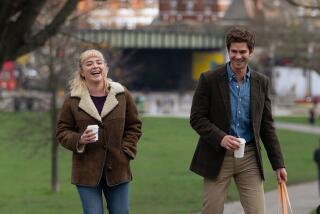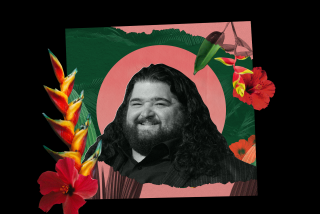Melancholy Comedy in Smart ‘Hurrah’
Laurie is a novelist who lives from “tiny windfall to tiny windfall.” As played by Peter Frechette, bitter envy invades his narrow eyes whenever he speaks to someone with money. Thea, his sister, married rich and lives in a Manhattan loft so large it has sectors. Invited there for a Christmas Eve gathering, Laurie seems to be coming unhinged, and he keeps badgering people to tell him how much money they have.
Thea’s having her own problems. She’s desperate to get pregnant and can’t, despite expensive fertility treatments. In walk their friends Oliver, who has a hit play and lots of money, and his wife, Gia, who carries her infant son just above her bulging, pregnant belly. And so the party begins.
Richard Greenberg’s “Hurrah at Last” is not, as might sound, a comedy primarily about envy. Like its main character, the novelist, it is funny, acerbic and delightfully straightforward about the falsehoods and bargains of intimacy. Commissioned by and premiering at South Coast Repertory in Costa Mesa, is the latest work from one of the sharpest, smartest, most unsentimental voices in American theater. If “Hurrah at Last” has a somewhat sketchy emotional arc, well, that’s what first productions are there to help fix.
Where Greenberg’s “Three Days of Rain,” also commissioned by SCR, was a melancholy memory play adorned by flashes of wit, “Hurrah” is framed as a comedy, but one with a melancholy interior. Laurie is in a dark place--feeling like a failure, naturally caustic, he sees through sentiment to the bare skeleton of human relations. He’ll never be completely broke, he speculates, because he’s related to people who will give him money “if I’m not too truthful.” But in fact he does speak candidly to his mother (the very funny Dori Brenner), who complains constantly and doesn’t take responsibility for her part in a bad marriage, and to his sister (Ileen Getz), who doesn’t work, and to his ostensible best friend, Oliver (Frederick Weller), whose worship of Laurie is suspiciously over the top.
Laurie’s worldview borders on corrosive and whiny, but it is so entertaining that we immediately identify with him. We are ready to go through a transformation with him when he is suddenly felled by a mysterious and life-threatening illness.
Thrust into the surrealistic world of illness, Laurie has hallucinatory conversations with the people in his life that are but slight exaggerations of the ones he’s already had. What he says to his sister in a fever dream, for instance, is no more excoriating than what he’s said to her in her loft (handsomely designed by Neil Patel). Of all the characters in the hospital sequence, his father, Sumner (George Coe), is most interestingly altered, but that’s because he remained mostly quiet in reality. In Laurie’s imagination, a strangely sanguine Sumner admits his marriage was a mistake. But it was nothing, he tells his son, compared to having children, an experience he likens to “an abyss.” “Once they come, they never leave,” he confides. “I did my best; it wasn’t good enough.”
This depressing confession--the antithesis of a Hollywood hospital scene--has a buoying effect on Laurie. It may not have actually happened, but it has the ring of what Laurie knows is truth. Later, in an elegant speech that echoes the Delmore Schwartz poem from which the play’s title is taken, Laurie describes the experience of having seen the world when “the ornaments fell from the trees, and then the leaves.” To his surprise, he finds out that the unadorned world is enough. Although it is extraordinarily well-written, as a redemptive moment it plays too small. Laurie’s out-of-body experience remains too close to his in-body reality.
Director David Warren is always alert to the cadences of Greenberg’s unusual wit, and the witty characters are all played well. As Laurie, Frechette gets at the pleasure and also the despair of possessing a singular worldview. Ileen Getz’s Thea is Laurie without the despair; together they convey the fellowship that often defines sibling intimacy when parents dislike each other. Gareth Williams is an amiable Eamon, patient husband to Thea. Judith Blazer is lovely and funny as Gia, whose faulty English prevents her from understanding anything she doesn’t want to confront. Weller struggles in the role of Oliver. Greenberg has written Oliver as more stupid and uninteresting than he needs to be, and the important rivalry between him and Laurie needs greater definition.
Though Greenberg makes Laurie the protagonist, he shares something with Oliver, too--he is blessed as a writer. Shapely quips and salty observations flow in a seemingly effortless stream. If the stream turns out to meander by the end of the evening, the voyage is still wonderfully smooth. In this probably still unfinished version of “Hurrah at Last,” you may not even realize you’ve been let down.
(BEGIN TEXT OF INFOBOX / INFOGRAPHIC)
* “Hurrah at Last,” South Coast Repertory, 655 Town Center Drive, Costa Mesa, Tue.-Sat., 8 p.m.; Sun., 7:30 p.m.; Sat.-Sun., 2:30 p.m. Ends June 28. $28-$43. (714) 708-5555. Running time: 2 hours, 30 minutes.
Peter Frechette: Laurie
Ileen Getz: Thea
Gareth Williams: Eamon
Frederick Weller: Oliver
Judith Blazer: Gia
George Coe: Sumner
Dori Brenner: Reva
Odin: Thunder
A South Coast Repertory production. By Richard Greenberg. Directed by David Warren. Sets Neil Patel. Costumes Candice Donnelly. Lights Peter Maradudin. Sound John Gromada. Production manager Michael Mora. Stage manager Scott Harrison.
More to Read
The biggest entertainment stories
Get our big stories about Hollywood, film, television, music, arts, culture and more right in your inbox as soon as they publish.
You may occasionally receive promotional content from the Los Angeles Times.










